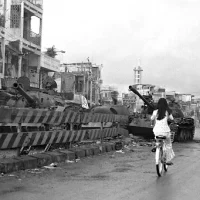The shaky peace that had held in Vietnam since the signing of the Paris Peace Accords in 1973 began to crumble in late 1974 after North Vietnam began a series of military offensives which pushed the South Vietnamese army back on its heels. By early 1975 it had become painfully apparent that there would not… Read More "Apocalypse Not – The Evacuation from Can Tho, Vietnam — April 1975"
The Fall of Saigon — April 30, 1975
April 30, 1975 will long be remembered as the day that Saigon fell and with it, the end of U.S. involvement in Vietnam. It also marked the beginning of Vietnam’s unification as a “socialist republic.” North Vietnamese forces began their final attack on Saigon on April 29, with a heavy artillery bombardment. This bombardment at the… Read More "The Fall of Saigon — April 30, 1975"
The Fall of South Korean Strongman Syngman Rhee — April 26,1960
Syngman Rhee, a staunch anticommunist and authoritarian, was the first president of South Korea. Backed by the United States, Rhee was appointed head of the Korean government in 1945 before winning the country’s first presidential election in 1950. He led South Korea through the Korean War, but because of widespread discontent with corruption and political… Read More "The Fall of South Korean Strongman Syngman Rhee — April 26,1960"
The Embassy Beirut Bombing — A Consular Officer’s Perspective
The suicide bombing of the U.S. embassy in Beirut, Lebanon on April 18, 1983 was the deadliest attack on a U.S. diplomatic mission up to that point. The blast killed sixty-three people, seventeen of whom were Americans. The attack is thought of as the beginning of anti-U.S. attacks from Islamist groups. This attack, along with… Read More "The Embassy Beirut Bombing — A Consular Officer’s Perspective"
The Bombing of U.S. Embassy Beirut — April 18, 1983
The suicide bombing of the U.S. embassy in Beirut, Lebanon on April 18, 1983 was the deadliest attack on a U.S. diplomatic mission up to that point. The blast killed 63 people, 17 of whom were Americans. The attack is thought of as the beginning of anti-U.S. attacks from Islamist groups. Along with the Marine… Read More "The Bombing of U.S. Embassy Beirut — April 18, 1983"
The late 1980s saw an alarming decline in U.S.-Libyan relations. A plane hijacking and airport attacks in Rome and Vienna in 1985, all linked to Libyan leader Muammar Qaddafi further escalated tensions between the two countries. The U.S. discovered that surface-to-air missiles were being deployed in Libya around the same time. In contravention of international… Read More "Crossing Qaddafi’s Line of Death – April 15, 1986"
Margaret Thatcher, the Iron Lady
One of the most prominent political figures in Cold War history, Margaret Thatcher, led Britain as the only female prime minister from 1979 to 1990. In these brief excerpts from their oral histories, Tom Niles recalls the surprisingly acrimonious meeting between President Reagan and Thatcher over sanctions, which eventually led to Secretary of State Haig’s resignation.… Read More "Margaret Thatcher, the Iron Lady"
It took place in the shadow of the dramatic evacuation from Saigon, which signaled the close of an era and the end to a U.S. presence in Vietnam. However, the fall of Phnom Penh proved to be an even greater tragedy, as it paved the way for a takeover by the ruthless Khmer Rouge, whose… Read More "Operation Eagle Pull before the Fall of Phnom Penh"
A Soul Filled with Shame –The Rwandan Genocide, April 7- July 18,1994
A colony of Belgium until 1962, Rwanda became dominated politically by the minority Tutsis. During the independence movement, the majority Hutus seized control of the government, killing thousands of Tutsis and forcing even more into exile. Many fled to Burundi and Uganda as refugees. Tensions between the two ethnic groups continued to fester over the… Read More "A Soul Filled with Shame –The Rwandan Genocide, April 7- July 18,1994"
“Two Men, One Grave” — The Execution of Pakistan’s Ali Bhutto
Zulfikar Ali Bhutto, founder of Pakistan People’s Party (PPP), served as president of Pakistan in the 1970s. By 1977, opposition against Bhutto and the PPP had grown due to incidents of repression, corruption, and alleged election fraud. Violence escalated across Pakistan, and Bhutto was overthrown by his army chief, General Zia-ul-Haq. Bhutto was put on… Read More "“Two Men, One Grave” — The Execution of Pakistan’s Ali Bhutto"


